Social CRM: What It Is and Why Your Business Might Need One
The complete guide on Social CRM, its capabilities, and benefits for business.
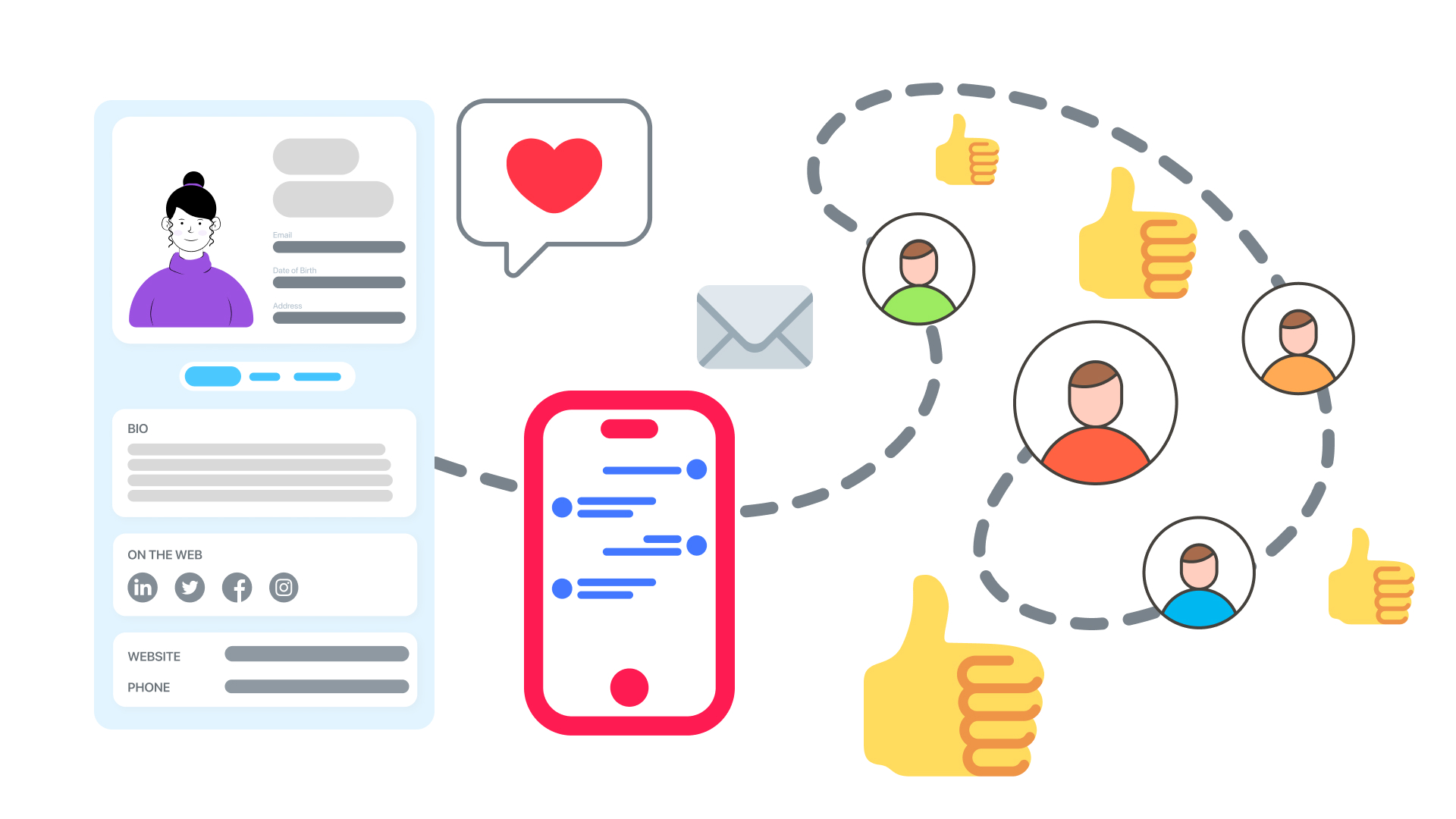
Social CRM is one of the fastest-growing phenomena in the field of marketing. The reason for this is that social media and messengers serve as key touchpoints with modern customers for companies of all sizes and industries. These communication channels have many benefits compared to more traditional emails and phone calls, providing high levels of both personalization and engagement. Since the combined audience of messaging and social media apps exceeds 5 billion, there is no doubt that utilizing these tools in digital marketing works helps achieve a broader reach among potential customers.
Social CRM is a customer relationship management system that comes with extra features for extensive support and integration with social media channels. It allows a company to streamline customer communication across numerous platforms, such as Instagram, Facebook, Twitter, and others, as well as get comprehensive up-to-date knowledge of the public’s sentiment towards the brand, performance of every channel, and every team member who connects with customers via social media. In the article, we’ll cover in detail the benefits of Social CRM, its essential features, best practices, and, of course, top solutions available.
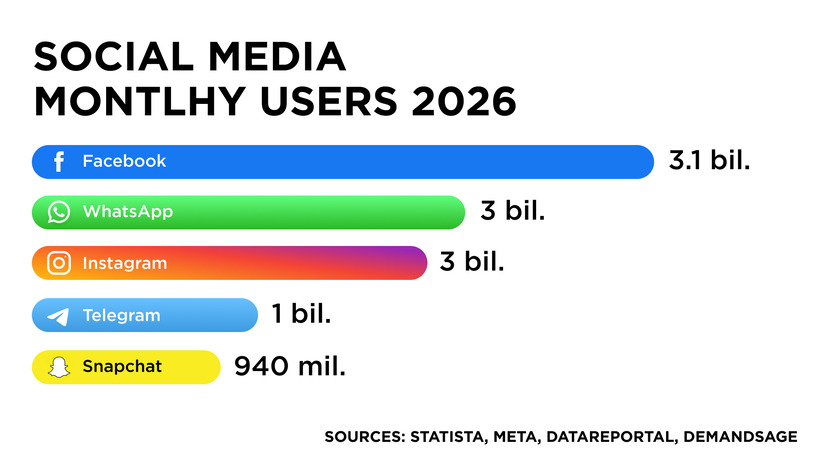
Table of contents:
What is Social CRM
Social CRM is a customer relationship management system with enhanced functionality for communicating with clients through social media and messengers.The defining feature of Social CRM is how it drives customer engagement and brand exposure without hard selling. This is achieved by sparking an interest in the brand by highlighting what is relevant and important to customers today. Also, Social CRM is more about two-way interactions: clients get a natural and easy way to initiate conversations via social media channels and messengers.
What is required for this concept to work? The extensive support of social channels of communication is a key benefit of social media CRM. Advanced integrations with messengers and social media allow companies to benefit from all modes of communication and analyze the results of their work. As a result, they take their customer communication to a whole new level, standing apart from competitors and gaining trust that converts into new clients and long-term customers.
Social CRM benefits
Let’s dive deeper into the benefits of adopting Social CRM solutions for business. The key advantages a business can achieve with it include:
- Enhanced customer support in a familiar environment. Most of us use messengers daily to interact with friends, family, and coworkers. Why force a customer who has an issue to sit down to write an email or set time aside for a phone call? Surveys show that the majority of people consider contacting support via instant messengers the most convenient option. With social media CRM, you can effectively process and analyze support requests coming from all social channels.
- Increased speed of interactions. Social channels provide a convenient way for businesses to interact with customers in real time. With the help of Social CRM, a company’s rep can process these interactions in a unified interface, no matter what channel a customer uses: Telegram, WhatsApp, or Instagram.
- Faster issue resolution with social media monitoring. One of the key functionalities of Social CRM is the constant monitoring of platforms for any mentions of the company, including negative ones. This allows brand representatives to react promptly to any complaints and maintain a good public image and sentiment.
- Rewarding brand advocates and loyal customers. Another benefit of social media monitoring via Social CRM is how it makes it easier to discover customers who are loyal to the brand, produce positive reviews of its products or services, or help those who run into an issue using them.
- Better exposure on platforms relevant to the target audience. Social CRM provides valuable tools for streamlining engagement with customers on platforms where they spend the majority of their time. These tools facilitate stronger customer relationships and increased loyalty.
Traditional CRM vs. Social CRM
Traditional CRM systems are designed to facilitate communication with customers through more traditional channels, such as email or phone, and no extra tools for social media and messenger marketing. In contrast, Social CRMs come with an extensive ‘arsenal’ of tools to monitor mentions of a brand in social media, reply to customer feedback in real time, and analyze all aspects of interaction via social channels. This enables a company to monitor the sentiment of its customer base and gain a deeper understanding of their preferences.
The line between traditional CRM and Social CRM systems is hazy. Some traditional solutions provide additional modules with the support of social channels, and some, even though considered ‘traditional’, come with pretty strong social functionality. One way is to regard Social CRM functionality as an extension of a common CRM, which gradually becomes more and more indispensable for modern business.
Types of Social CRM systems
Social CRM solutions can be broadly categorized into two main types. Stand-alone Social CRM systems are independent products with full CRM functionality and extended support of social communication channels. Companies can use them independently to manage customer relations, without purchasing any other tools. Meanwhile, there are solutions that provide social features and must be integrated into other CRM systems. These typically take the form of an API and support the most popular CRM systems. For example, Umnico CRM integrations with Bitrix24, amoCRM, and other software expand their capabilities in the field of social media and messenger communication.
Social CRM market size
Studies show that more and more companies consider social networking with their clients beneficial for their business and adopt social media marketing as an essential part of their promotional strategy. According to IndustryARC consulting, from 2022 to 2027 the global Social CRM market size is expected to grow at a CAGR of over 20%, reaching $53.1 billion. It is also forecasted that spending on social media CRM applications is likely to grow at a faster rate compared to traditional CRM. All of this confirms that more companies seek to employ social channels to interact with customers and businesses that don’t start doing it soon risk losing their market share to competitors.
How to use Social CRM software
Social CRMs assist businesses in reaching customers at all stages of their journey, from brand discovery to post-purchase support. This article reviews the major strategies for using Social CRM systems to grow a business and improve its performance.
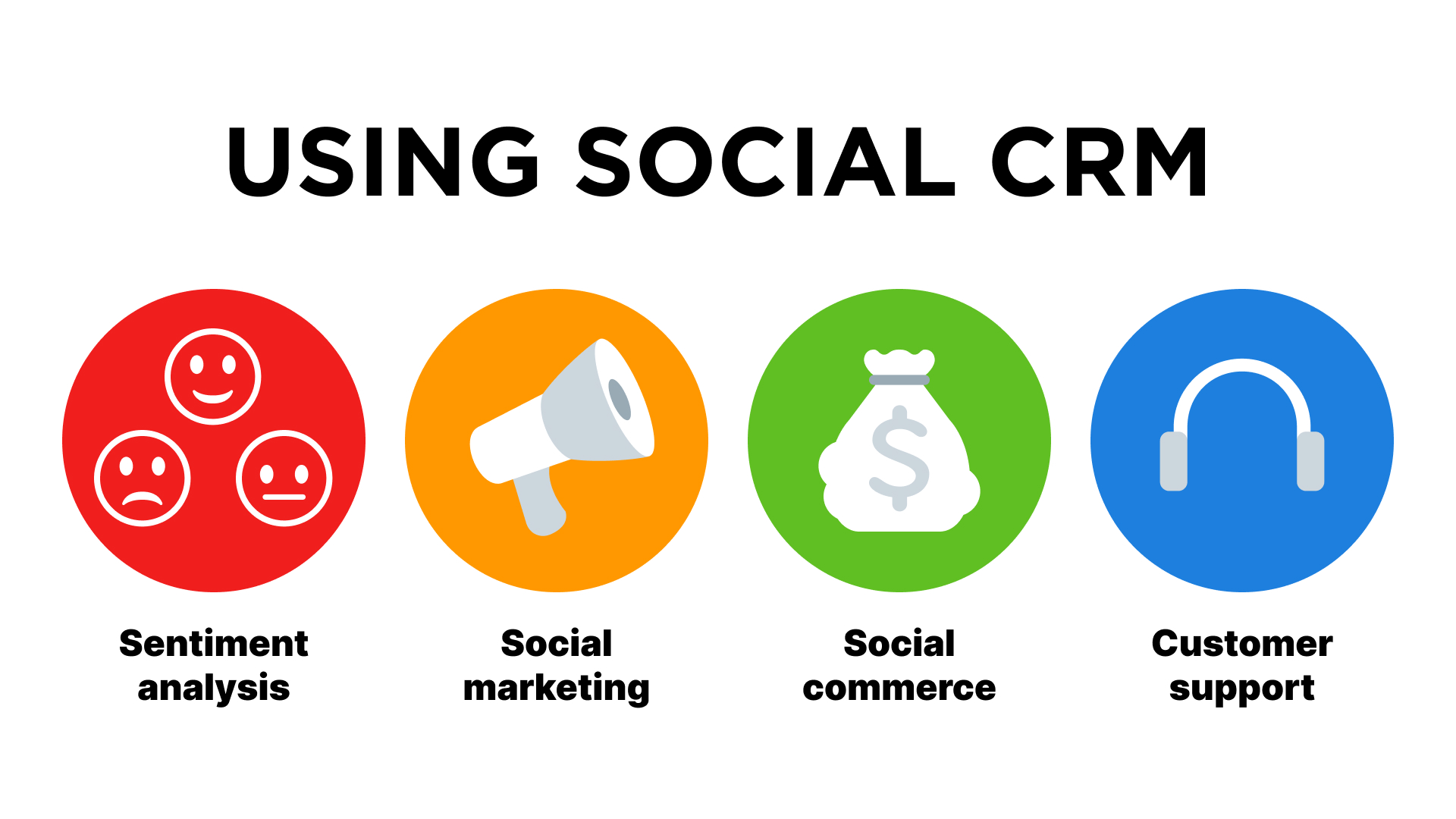
Sentiment analysis
These days, word of mouth is conveyed through social media. People buy products, try them out and share their experiences with friends on such platforms as Instagram or Facebook. Usually, public reviews come with mentions of the brand's profile (using @) but can also include names of key employees of the company, and names of products and services. A prompt reaction to mentions, both negative and positive, provides plenty of opportunity to improve the brand’s perception by the public. Such sentiment monitoring is possible with Social CRM tools for Instagram and other platforms. They include notifications when someone mentions a brand or a product in a post, comment, or story.
For example, if a customer creates an Instagram post, in which they share a negative experience of using your product or service, an Instagram CRM notifies the customer service department about it. A prompt reaction from the company’s or its representative’s account can downplay the negativity and avoid a chain reaction where the post’s author’s subscribers develop a negative sentiment towards your products. The same goes for positive reviews: a reaction from a brand, in the form of simple gratitude or additional discount, can help nurture future brand evangelists and advocates.
Social marketing
With Social CRM, companies can increase customer involvement and stimulate them to participate in a brand’s story rather than be passive spectators. By being open to suggestions and feedback, reacting to mentions, and increasing presence on the platforms that customers actively use in everyday life, a Social CRM system expands the possibilities of two-way customer interactions.
Social marketing approaches that are possible with Social CRMs are completely different from blog posts, ads, and YouTube videos that remain essentially a one-way communication. A Facebook chat feels more personal than an email and adds value to the brand in the eyes of a customer.
Social commerce
Social CRM is also an effective tool for selling products and services in a new way. Traditional methods such as cold calls and emails are no longer as effective, while personalized communication via social media and messengers has a higher chance of establishing a meaningful connection with a potential customer and leads to a better conversion rate. With the tools available in Social CRM, a sales agent can initiate a conversation in one channel (e.g. WhatsApp) and then resume it in another one (for example, a customer decides Telegram is more convenient). The key benefit is that all details provided by a client through multiple channels are accumulated in the Social CRM system, enabling the employee to gain a comprehensive understanding of the customer’s preferences, budget, and needs.
Helpdesk & Customer Support
This point builds on the previous one, but at different stages of the customer journey. Regardless of whether a client decides on a purchase or requires support after making it, Social CRM allows for the provision of personalized shopping guidance and post-purchase support via channels that are most convenient for them. Here, the benefits of a CRM system, which provides centralized access to client details, order history, and communication via several channels in a single interface, are even more evident. A shopping assistant can use this data to select a suitable product and avoid asking numerous clarifying questions. Social CRM’s ticket categorization and routing make it easy to assign an inquiry to a competent specialist and automatically provide all necessary information on the issue.
Social CRM metrics
When using a Social CRM system, it is important to track these KPIs (key performance indicators) in order to measure its usage results.
Engagement. Measure how users interact with your website instead of a simple number of clicks. This metric includes likes, shares, reactions, and comments on different social media platforms.
Brand mentions. Using Social CRM, a business can determine how many people discuss it in public space and what is their general sentiment towards it as a whole, as well as particular products and services.
Traffic. Social CRM can track how much traffic each social media and messenger channel drives to the website and its conversion rate. This allows a marketing department to determine what channels are most used by the target audience and what type of content is most effective in attracting leads to the website.
Followers activity. Quantity doesn’t always mean quality and Social CRM makes it easy to analyze not only the number of the brand’s followers on every platform but also the level of their activity, such as comments, likes, shares, and so on.
Churn rate. It is also known as customer churn, which measures the number of customers or followers who decide to stop interacting with a business by leaving a list of your subscribers within a given period. It can also refer to the amount of revenue lost as a result of the departures.
Essential features of Social CRM
Social CRMs are complex tools that are used by businesses at all stages of the customer journey. Thus, there are several key features that a system should have to help streamline interactions with customers. Let’s explore them more closely.
Customer profiling
Social CRM should be able to aggregate details of customer profiles from multiple platforms to provide a comprehensive overview of their interests, activity, and previous interactions with the company. It is also useful if the system provides customization options to arrange and show only the details of a customer from particular channels.
Social listening
An ability to collect data from customers by keeping track of what people are saying about a brand on social media is a crucial component of a Social CRM. It helps to adjust marketing, selling, and support accordingly, to improve customer service and the brand’s public perception.
Multichannel integration
The number of social media users grows every day, just as new platforms appear frequently. To achieve full coverage and efficient communication, pay attention to what channels a Social CRM supports. Of course, a large number of channels is preferred, but it is also important to have the support of the channels most popular with your audience, whether it is Facebook, Instagram, Viber, Telegram, or another platform.
Since interactions with customers extend beyond social media and include emails, phone calls, and even live chats, it's crucial to make sure you're informed about these encounters in real-time so you can react to them promptly. Omnichannel integration also makes it easy to have centralized access to the history of correspondence between the company’s employees and customers.
Performance analytics
It is hardly possible to assess the effectiveness of Social CRM and whether it fits the bill without having accurate figures on hand. With this in mind, choose a Social CRM system that provides powerful analytics tools. The data you should be able to view and analyze should cover your consumer audiences: their numbers, activity across channels; and staff performance as well: conversion rate, average number of tickets, and support agent’s rating.
Does your business need social media
Whether it is a huge national corporation or a small local business, whether you provide digital services or repair cars, social media plays a crucial role in the marketing of modern business. If your business performance shows that you need any of the following, it is likely to benefit from Social CRM implementation.
- Reinforced lead generation.
Today, people frequently discover products by simply scrolling through Instagram feeds or other social media channels. Neglecting them means missing a large part of your potential customer base to competitors. While maintaining an active and diverse social media presence is a step in attracting new clients, reaching out to them via social networks and messengers can take things to a whole new level and significantly improve lead generation. And this is what Social CRM can help you with. - Better customer engagement.
Communication is what maintains relationships both in our private and business lives. The same goes for brand-and-customer relations. Staying visible to customers through and making it in less explored ways (not with overused email promotions) is a sure way to increase purchase frequency and maintain strong bonds with loyal clients. - Improved satisfaction with the service.
Instagram, Facebook, and other platforms are great tools to gather feedback and provide support to customers. Employing a practice of messaging a customer after purchase to learn about their experiences and remind them there is always someone to help if they run into an issue can not only improve your relations with that particular person but also gather valuable feedback that can be used to improve your products and services.
Best Social CRM tools
After learning about Social CRM’s benefits for business, it is time to take a look at the companies that provide the best social media CRM software.
Umnico
Umnico is an omnichannel communication platform and Social CRM that provides businesses with all the tools necessary for improving the quality of customer communication, digital marketing, and sales. The platform allows connecting over 25 channels: all main social media and messaging platforms, as well as live chat, email, and VoIP telephony.
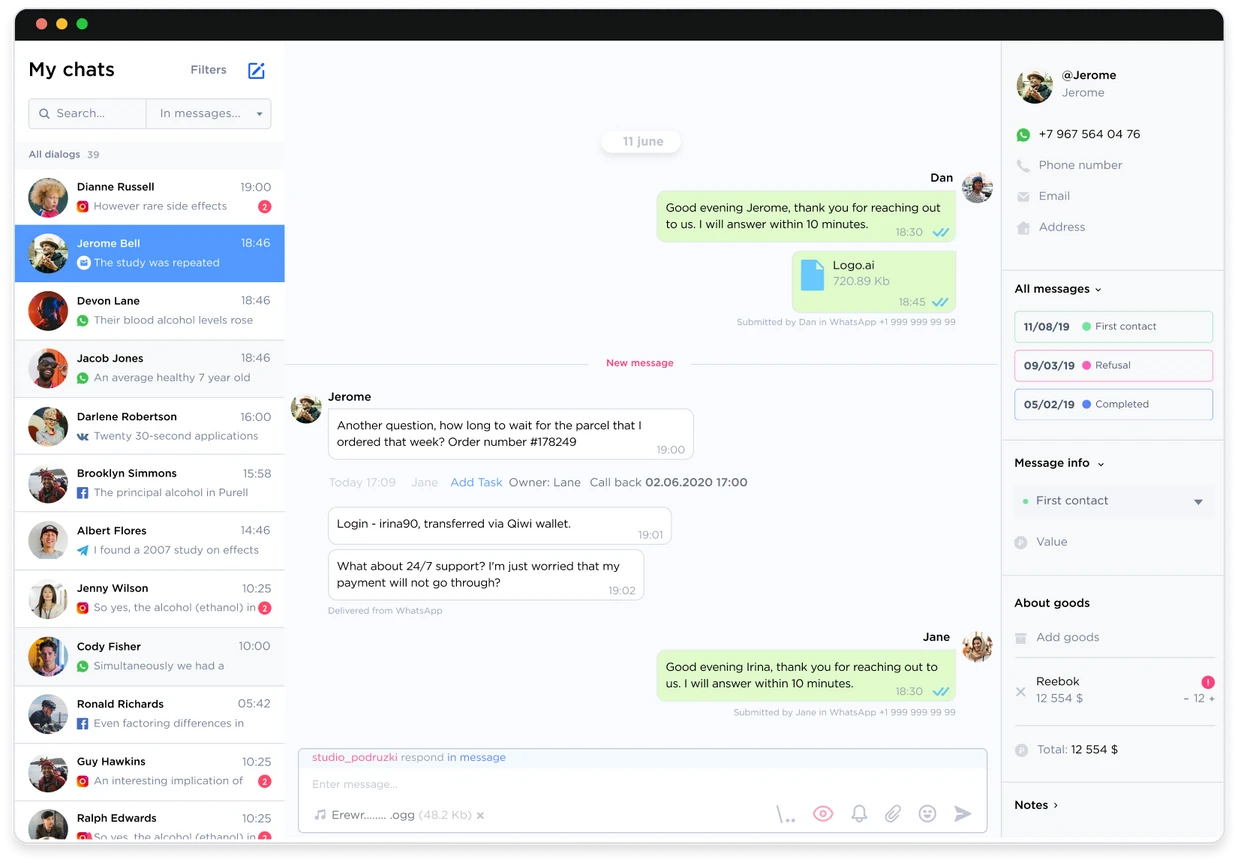
Umnico stores all correspondence history together, so an employee can easily find details of a client's previous conversation with another agent. This functionality is complemented by small business CRM features, such as sales funnel and task manager, which allow tracking the status of deals, assigning them to sales reps, and monitoring their performance. Thanks to the full support of messengers’ functionality, Umnico users can enjoy all features of a messenger, for example, quoting and tracking delivery status in WhatsApp. The platform's intuitive chatbot builder makes it easy to automate round-the-clock customer service.
Price: starts from $8 per month only. Umnico users can design their own rate, choosing only integrations with instant messengers and social media they need, and get a discount when buying a subscription for 3 months or more.
Nimble
Nimble is a CRM enriched with tools for social selling, contact management, and marketing automation. The system’s core feature is collecting details on every business contact from sources all over the web, such as Facebook, LinkedIn, and email, and then combines them in a contact card. The same happens with communication history: all correspondence details and appointments related to a particular contact get arranged on a unified contact page. With Nimble, users also get a 360-degree view of customers and leads, as well as common CRM functionality, such as sales pipeline, forecasting & analytics, while email marketing features enable them to send personalized group emails with tracking, and analytics on the number of email openings and clicks.
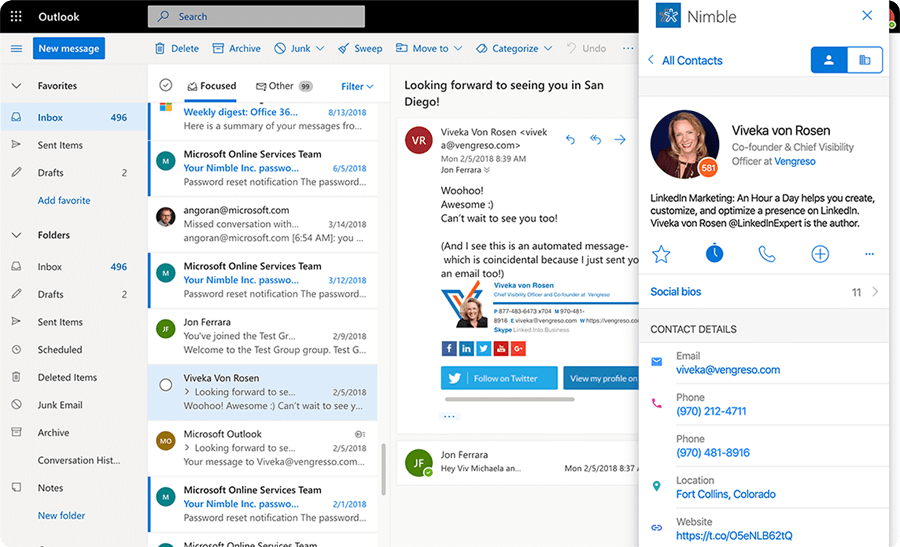
Nimble’s Prospector is quite a unique feature of the platform. It is a browser extension that shows details on contacts and all team interactions, automatically updates contact records, and synchronizes them with the CRM’s database. It supports all major browsers, including Chrome, Safari, Edge, and Firefox, helping sales reps to discover high-quality leads and close deals faster.
Price: Nimble has only one price plan, which is $24.90 per month if billed annually and $29.90 if billed monthly.
Zendesk
One of the leading companies in the customer service software industry, Zendesk also provides advanced functionality for integrating with Facebook, Twitter, and other platforms. It automatically converts conversations in social media into tickets and allows agents to use both public communication channels (tweets, for example) and private messages via a single interface, while all data and correspondence history are saved in a single location.
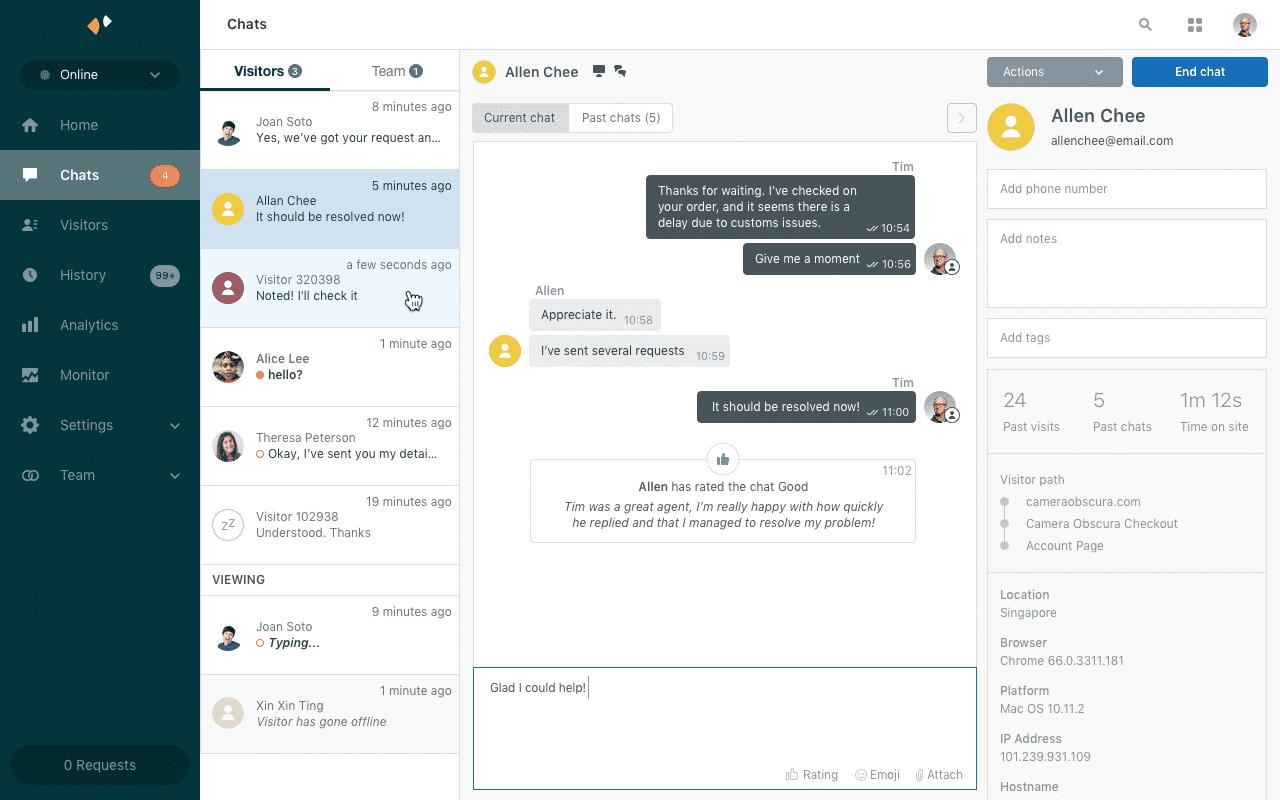
Price: Zendesk provides several pricing plans with different numbers of customizable pipelines, data storage space, and activity reports. The price for the basic Support plan starts from $19, though full omnichannel social features are available in the Zendesk Suite plans starting at $55.
HootSuite
HootSuite is a popular social media tool that allows companies to manage their social media presence across multiple channels in one place. The platform has scheduling and analytic tools for posts, as well as social listening functionality to monitor mentions of a brand’s name and keywords.
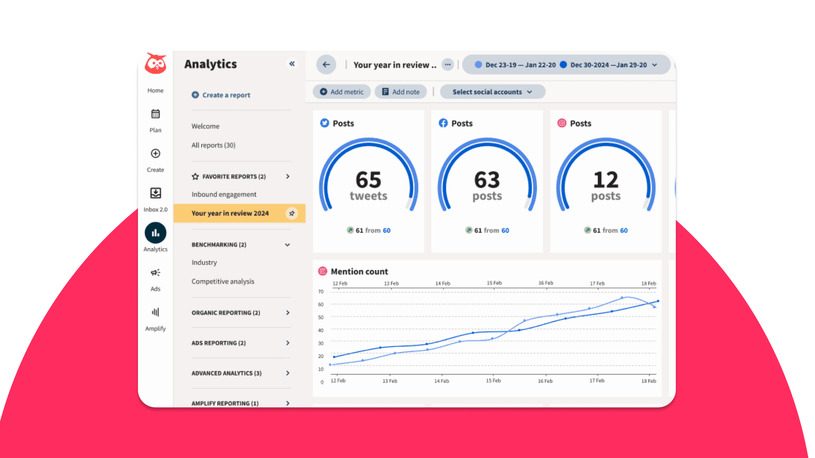
Although it supports full integration with Salesforce, a leading CRM solution, HootSuite also comes with built-in basic CRM functionality, which, together with Social Media Dashboard, makes it a capable Social CRM. HootSuite allows its users to view analytics on followers’ activity, discover the best outreach tactics, create a stock of responses to communicate more efficiently, and learn messages’ click-through rates, checkout completion time, and other metrics.
Price: Being on the higher end of the price spectrum, HootSuite offers three subscription plans with different functionality. Pricing starts at $199 per month for 1 user and 10 social accounts.
Buffer.com
Buffer is a customer relationship management tool with functionality to promote meaningful customer engagement and better sales on social media. The platform allows companies to plan and publish their content across multiple channels, analyze the performance of every post and conveniently engage with followers and subscribers.
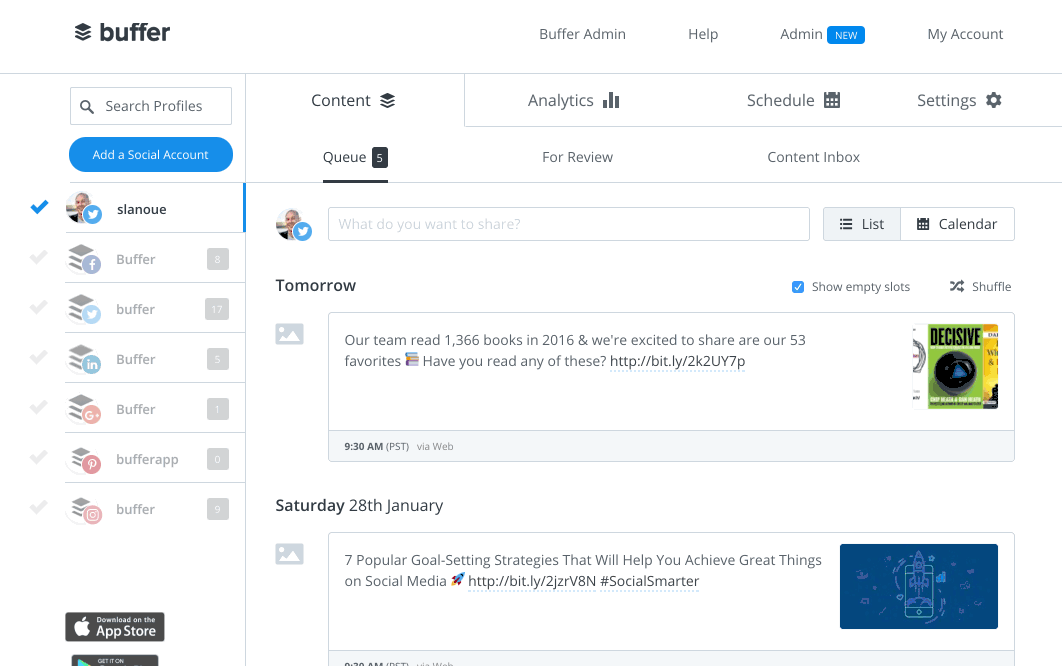
Buffer’s dashboard for social media collects all comments on posts in an easy-to-use interface, with AI-based smart alerts highlighting the ones that require immediate response and hotkeys making communication more efficient. The platform’s analytic tools provide insights into audience preferences, demographics, and performance of organic vs. booster posts to help determine the best time, frequency, and subjects for content.
Price: Buffer’s basic account with publishing tools and support for three channels is free. More advanced functionality, including analytics and engagement tools, is available with paid plans that start from $5 per channel per month.
Social CRM tips & best practices
Congratulations on having read this far! Now we’re going to touch on the subject of the most effective tactics for utilizing Social CRM.
- Track keywords and tags related to your business, names of products, and key people within the company, and not only @-mentions or #-tags of your brand. This way you won’t miss any conversations on Instagram or Facebook, where you can participate and show your expertise, customer care, and client-oriented attitude.
- Interact with your audience in different ways. For example, launch a contest for the best idea for the name of your new product, with a valuable prize for the winner. Track how the audience reacts to such a campaign in different channels and use the insights to adjust media presence, ads’ tonality, and formats of communication.
- Provide real-time support to a customer reporting a problem both in public and private channels. With the help of Social CRM, an assigned support agent can start a conversation with plenty of data, which decreases the number of clarifying questions. They can then continue the conversation seamlessly using a different channel, according to the client’s preferences.
- Support fan pages and groups devoted to your brand created by clients. Social CRMs make it easier to maintain customer relationships by discovering such communities and the most active contributors in them. Offer promotion and support to such groups, as well as various benefits to the most active brand advocates.
- Use CRM’s insights to create targeted campaigns. The vast and valuable data gathered by Social CRM can and should be used to its fullest extent. One of the options is to define audience segments with the help of Social CRM: establish groups of customers who share the same demographics, preferences and most-loved social media and messenger channels; then create highly targeted campaigns and promotions with high conversion rates.
How AI transforms Social CRM
AI tools can be seen everywhere today and Social CRM tools are no exception. By leveraging AI chatbots, businesses provide instant, personalized responses across social and messaging channels, qualify leads, support social commerce transactions, and escalate complex cases to human agents with full context right away. This results in better efficiency and customer satisfaction.
At the same time, AI enhances Social CRMs through advanced analytics, lead management, and sentiment-aware social listening. AI tools can analyze brand mentions, detect trends, predict customer intent, and prioritize high-value leads based on engagement patterns.
As social commerce continues to grow in popularity, AI is likely to become essential for managing customer relationships, enhancing brand reputation, and staying competitive in an increasingly conversational digital landscape.
Frequently asked questions
Let’s dive into some common questions about Social CRM solutions.
How much does Social CRM software cost?
The cost of Social CRM software depends on the scope of features, supported channels, and team size. Entry-level social media CRM tools typically start at $6–$8 per user per month, covering basic omnichannel communication and customer support. More advanced platforms with built-in analytics, social listening, AI chatbots, and lead management can range from $30 to $100+ per month, especially for enterprise use.
Is Social CRM suitable for small businesses?
Yes, many platforms are built specifically with small and medium-sized businesses in mind, offering affordable plans and simple onboarding. For small teams, a social media CRM helps centralize messages from Instagram, WhatsApp, Facebook, and other channels into a single inbox, leading to improved response times, customer satisfaction, and overall brand perception without increasing headcount.
What is social listening in CRM?
Social listening involves monitoring social platforms for brand mentions, tagged posts, comments, keywords, and even competitor names. Using it, businesses can track public conversations, respond to feedback in real time, spot emerging trends, and proactively engage potential customers.
How does Social CRM help with customer support across different time zones?
Social CRM platforms enable global customer support.A unified inbox ensures that messages from all channels are visible in one place, regardless of when they arrive. AI chatbots can automatically acknowledge inquiries outside business hours, answer common questions, and collect lead data. Messages can also be routed to available agents in different time zones, ensuring consistent support quality and customer engagement.
Conclusion
Social media is one of the most important areas for a modern business to find new clients and maintain relationships with existing ones. Making this process as efficient as possible requires a set of specific tools — a Social CRM system. In contrast to traditional systems, CRMs for Facebook, Instagram, and other platforms are more focused on two-way interactions with customers and provide tools to track sentiment towards the company, manage a unified client details database and connect with them in real time across multiple channels.
If you are looking for a Social CRM system that combines omnichannel communication with an attractive price and user-friendly interface, consider trying out Umnico. The platform merges conversations with clients in messengers, social media, chats, and email into a single window, providing essential insights into employees’ performance and customers’ activity, sales funnel, task manager, and automation tools. A free trial period allows you to assess the platform’s capabilities without any limitations or financial commitment.
You might be interested in the similar topics
Customer Communication Management: What You Need to Know

Subscribe to Umnico news!
Be the first to get recommendations and up-to-date information
